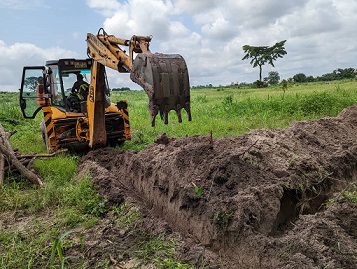CSIR-Crops Research Begins Rice Methane Reduction Trials
“This project not only contributes to global climate goals but also strengthens Africa’s resilience to climate impacts, benefiting farmers and communities alike.”
- Advertisement -
As part of efforts by agricultural experts toward sustainable food production in the country, the Council for Scientific and Industrial Research (CSIR) Crops Research Institute has begun preparations for pioneering trials aimed at reducing methane emissions from rice production.
This initiative, part of the Agroecology and Circular Economy for Ecosystem Services in SSA (ACE4ES) project, marks a pivotal moment in advancing climate-smart farming practices in Ghana.
- Advertisement -
Supported by funding from the Climate and Clean Air Coalition hosted by the UN Environment Program, the project focuses on tackling methane emissions, a potent greenhouse gas predominantly emitted during flooded rice cultivation.
- Advertisement -
By integrating innovative methane reduction technologies, such as alternate wetting and drying (AWD) systems and biochar applications among others, the institute aims to mitigate environmental impacts while enhancing agricultural productivity.
Dr. Kwaku Onwona-Hwesofour Asante, Project Lead for the ACE4ES project, emphasized the importance of these trials in addressing climate change challenges in agricultural sectors.
“Reducing methane emissions from rice fields is crucial for sustainable development and climate action in rice-producing economies,” he stated. “Through rigorous experimentation and collaboration with local farmers, we aim to identify practical solutions that balance environmental stewardship with food security.”
The field preparations have involved meticulous site selection and soil preparation to ensure optimal conditions for the trials.
- Advertisement -
The rice technical team, consisting of Dr. Charles Afriyie-Debrah, Dr. Clement Peprah, Prof. Raphael Kwame Bam, Dr. Maxwell Darko Asante, and Dr. Felix Frimpong played essential roles during these initial stages.
“We are committed to fostering partnerships and knowledge exchange to scale up successful methane reduction strategies,” noted Dr. Kwaku Asante.
“This project not only contributes to global climate goals but also strengthens Africa’s resilience to climate impacts, benefiting farmers and communities alike.”
The CSIR-Crops Research Institute anticipates that findings from these trials will inform national policies and encourage widespread adoption of climate-smart agricultural practices across the region starting with the project’s targeted countries including Ghana, Nigeria, Benin, and Tanzania.
As the project progresses, stakeholders remain optimistic about its potential to pave the way for sustainable agricultural development in Africa and beyond.
For details about the ACE4ES project in Ghana and its milestones by the CSIR-Crops Research Institute, visit https://cropsresearch.org/
Source:newsghana.com.gh
- Advertisement -


